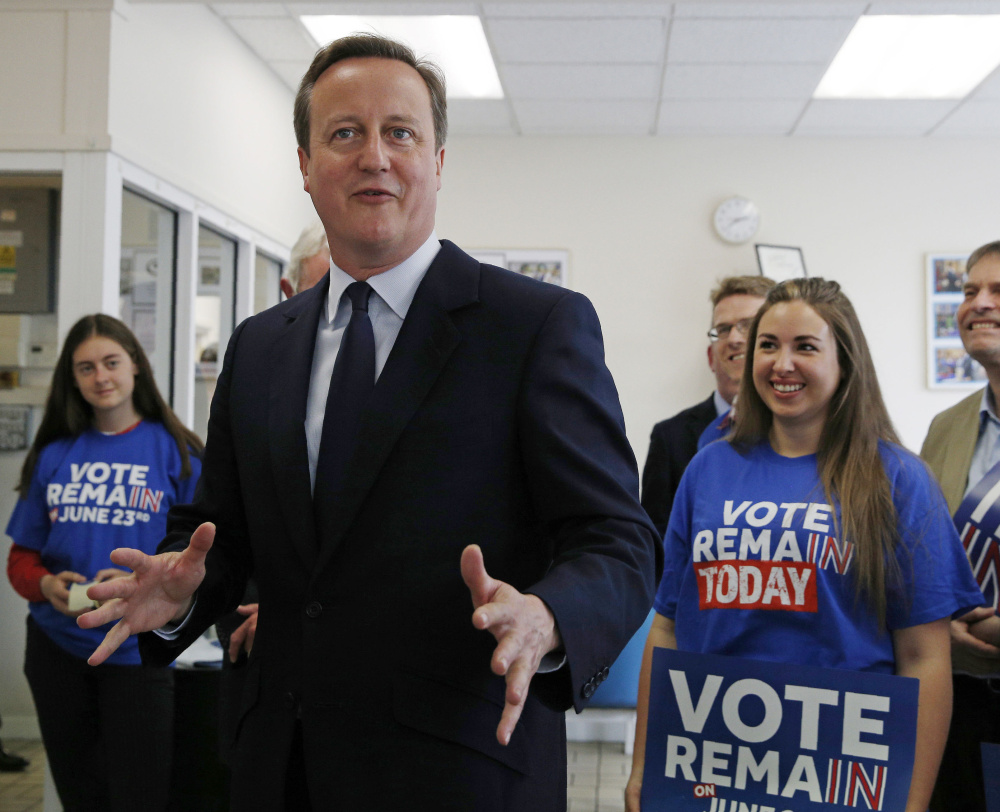As voters in Britain prepare to decide whether to leave the European Union in a referendum this week, British expatriates in Maine are watching closely, but staying out of the fray.
The campaign over “Brexit” has been heated on both sides, with emotional appeals to stem immigration and protect British sovereignty on one side and nightmare predictions of economic and societal catastrophe on the other. The campaign has been more heated than expected, and last week, Jo Cox, a British parliamentarian who supported staying in the EU, was assassinated by a man who reportedly shouted “Britain first” before shooting and stabbing her to death.
According to a BBC analysis of polling data, the campaign is neck-and-neck, with 45 percent in favor of remaining and 42 percent wanting to leave the EU.
But for most Brits on this side of the pond, the issue, while interesting, is tangential to their everyday lives. None of the British citizens interviewed was voting in the referendum Thursday, and some said they had made a conscious decision to stay out of United Kingdom politics entirely.
“If you don’t live somewhere, I don’t think you should vote in it,” said Philip Jones of Yarmouth. He moved to New York City from London more than two decades ago, has lived in Maine for the last eight years and is a U.S. citizen.
Jones fully supports keeping Britain in the EU. Leaving the union would be disastrous for the British economy, he said, and could lead to the breakup of the union of England, Scotland, Wales and Northern Ireland. He feels the anti-immigration rhetoric from the leave side is “awful, appalling” and voting to leave would mean closing the door on a political union that has helped preserve peace in Europe after two world wars.
Despite his position, Jones never planned to vote in the election.
“I have strong feelings about Brexit, but it is not really my fight,” he said. “My own feeling, for me personally, you should only vote where you live. If you don’t have skin in the game, it’s not really your business.”
Even if expats did want to vote, they might not be able to. The U.K. allows overseas voting, but it is only open to people who have registered to vote in Britain in the last 15 years. A group of expats has been fighting an unsuccessful legal battle to change that rule for the referendum.
Exclusion doesn’t seem to bother expats living in Maine.
Dan Brookham, a business insurance broker from Rockland, said he is “ferociously opposed” to Brexit. Every time he visits the country, he notices how much more affluent and diverse it is, thanks, he said, to its membership in the EU.
“We were a trading nation for a couple hundred years. For us to turn our back on trade and partnership and travel is anathema to being British,” he said.
Brookham moved to the U.S. in 1995 when he was 21, but retained his U.K. citizenship. Although some of his relatives who live in mainland Europe are frustrated that they are barred from voting, it doesn’t bother him.
“My feeling is, I live here, I’ve lived here basically my entire adult life,” he said. Even if he were allowed to vote he wouldn’t, because he feels it is unfair, Brookham said.
Jon Meek, a broker with Tru Brit Realty Group in Portland, moved to the U.S. in 2003 and is still closely connected to the U.K., going back two or three times a year. The rhetoric in the campaign has been controversial and played to the emotions on both sides of issue, and he feels that British voters are really undecided.
Although he could have voted, he isn’t going to.
“We should, but obviously being involved, living over here in the U.S., our focus tends to be a little more on what is going on in front of us,” he said.
European Union politics have never really been exciting, and the referendum was expected to be about dry, dull policies and regulations, said Henry Laurence, a political science professor at Bowdoin College.
Laurence grew up near Oxford, England, but moved to the U.S. 25 years ago.
Despite the drama and emotion, British expats still don’t feel a connection to the issue that would drive them to go out and vote, he added.
“I think the EU vote, while consequential, doesn’t raise to the level that it is something expats have a lot of feeling about,” Laurence said.
Send questions/comments to the editors.




Success. Please wait for the page to reload. If the page does not reload within 5 seconds, please refresh the page.
Enter your email and password to access comments.
Hi, to comment on stories you must . This profile is in addition to your subscription and website login.
Already have a commenting profile? .
Invalid username/password.
Please check your email to confirm and complete your registration.
Only subscribers are eligible to post comments. Please subscribe or login first for digital access. Here’s why.
Use the form below to reset your password. When you've submitted your account email, we will send an email with a reset code.